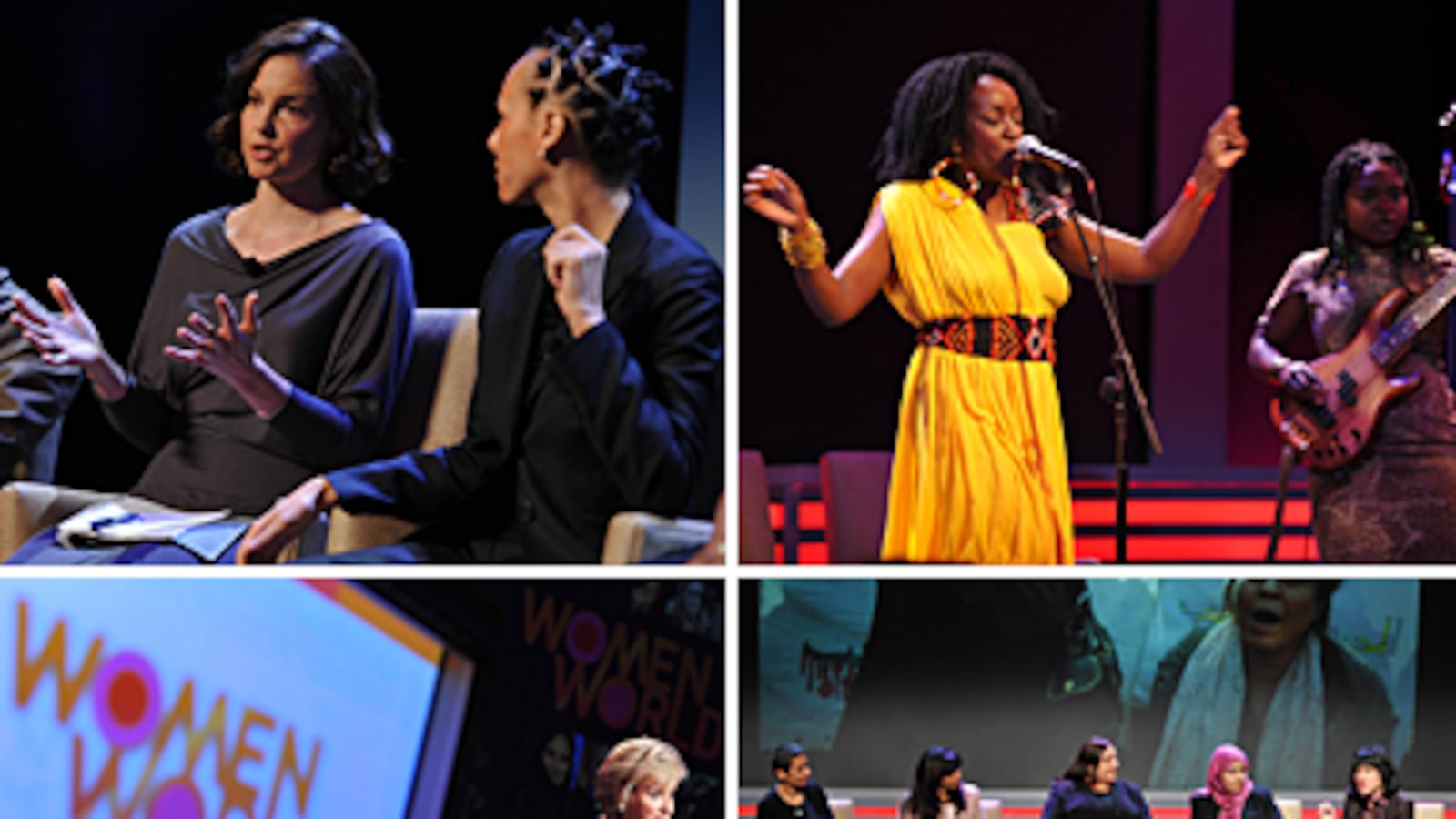Plus: • Watch video highlights. • Read about 13 riveting moments from the summit. • Read Lisa Miller’s story on Hillary Clinton’s fiery speech. • See complete coverage on our blog.
Gallery: See Photos from the Summit

An Egyptian blogger urges young Muslim women to harness the Internet to battle an oppressive regime. A Cambodian teen—who only three years ago was scavenging for food in a toxic dump—dances beautifully onstage, showcasing the potential of girls in developing nations. And a young doctor captivates with her saga of quitting her job as a University of Chicago surgeon to bring modern medicine to millions in Africa.
These stories and more inspired powerful women activists, politicians, and philanthropists to pledge over $100,000 to combat sex trafficking and acid violence, fight rape as a weapon of war, and support the irrepressible Dr. Hawa Abdi's utopian, 90,000-strong refugee camp in war-torn Somalia at Newsweek and The Daily Beast’s second annual Women in the World Summit this weekend. Over the three-day event in New York City, Secretary of State Hillary Clinton passionately told Middle Eastern women they "deserve a voice and a vote,” survivors shared emotional stories from Cambodia and Congo, and human-rights activists debated France's controversial veil ban.
Women leaders also offered up creative solutions to the problems facing women in both developing and developed countries. Goldman Sachs' Dina Habib Powell and Iraqi-American activist Zainab Salbi explained in a panel on Friday how equipping women with basic business skills and providing them with small lines of credit transforms entire communities: Once women in developing nations have an income, they send their daughters to school. And a modest 1 percentage point increase in female education boosts GDP growth by 0.2 on average, Powell said.
In a panel on the Mideast’s women firebrands, Egyptian blogger Dalia Ziada told ABC's Christiane Amanpour that the Internet "unveils" women in the Muslim world, allowing them unprecedented access to the political world. Nawal El Saadawi, an Egyptian writer, activist, and psychiatrist, said on Saturday that marching in Tahrir Square in January was a lifelong dream—and that the revolution appeared to have temporarily dissolved generations-long inequalities between men and women. "I saw young women sleeping under the same tents with young men who they didn't know and not a single harassment," she said.
Still, Secretary of State Hillary Clinton and her predecessors Condoleezza Rice and Madeleine Albright all cautioned that Mideast countries in transition must include women in the political process, or the peace won’t last. “The ability of Egyptian and Tunisian women to participate in the decisions that will shape their nations’ futures will go a long way toward determining whether democracy actually takes root in North Africa,” Clinton said. Albright also called the frequency of sexual assault in Egypt "horrifying," while Rice warned that a democratic opening in Egypt means "we're going to hear a lot of voices that we don't want to hear… I think it's going to be quite turbulent and quite difficult."
In a conversation with Daily Beast writer Eliza Griswold, Dr. Hawa Abdi, trained as a gynecologist, shared how, through sheer grit, she transformed a one-room medical clinic into a utopian refugee camp for tens of thousands of Somalis—warding off brutal attacks from rebel soldiers. “If you don’t follow our rules, you lose your piece of land," Abdi said of her credo, and her daughter added that they've raised a whole generation of boys who now guard their 1,300-acre oasis from harm. “I will die with my dignity,” Abdi said when asked if recent attacks and murders of her staff have scared her into giving ground.
Former Dutch parliamentarian and human-rights activist Ayaan Hirsi Ali argued in a heated discussion on Saturday moderated by The Daily Beast's Andrew Sullivan that France's controversial veil ban will protect girls who are forced into wearing the garb by their families. "There are things about that religion I refuse to respect," she said. "I refuse to respect the father who marries off his 9-year-old daughter. And when in outrage he's told, 'Why are you arranging a rape for a 9-year-old child?" says, 'Well the Prophet Mohammed did.' My response is not only ‘you are wrong,’ my response would be the Prophet Mohammed is also wrong. And it's up to the Muslim: What offends you more?"
Yet the Council on Foreign Relations' Isobel Coleman worried the ban would serve to keep women out of public space and restrict their freedom of choice. She likened France's new law to bans in Mideast countries on wearing Western clothing, and said both were insidious.
Participants also shared emotional and personal stories, including actress and activist Ashley Judd's tale about her own brush with sex trafficking, when a child she knew well was picked up by a pimp at the Atlanta airport and swept up into an underworld of child sex exploitation. Yem Chhoun recounted the harrowing story of how her husband's mistress sneaked into her house in a Cambodian village and attacked her with acid six years ago, leaving her and her newborn disfigured—and the strength it took to recover from the attack. And 16-year-old Cambodian girl Sokha Chen performed a haunting and beautiful traditional Cambodian dance on stage just three years after she was rescued, starving, from Phnom Penh's toxic garbage dumps by Chicago tourist-turned-activist Bill Smith. Chen is now a subject of a film that is the centerpiece of 10x10, a global campaign to spotlight the huge potential of girls in developing countries.
The summit's attendees also addressed why women aren't taking over boardrooms around the world. In a panel that included MTV CEO Judy McGrath, Tina Brown, and other media trailblazers, Huffington Post founder Arianna Huffington offered her thoughts about why men still control the top spots in most media organizations. “Women still have a problem with being judged," she said, recalling that her female friends were much less likely to want to blog on her site than her male friends. "And anything we write, anything we do is going to be judged.”
Meanwhile, Jezebel creator Anna Holmes said women's magazines' relentless focus on pleasing men and being skinny prompted her to found the popular blog, which mixes pop culture with more serious takes on politics and women's issues. "I thought, if I can’t do it in print, I’ll do it online," she said. In another panel, Mika Brezinski, co-host of CNBC’s Morning Joe, said women need to “Know your own worth–and say it.” Facebook's Sheryl Sandberg lamented that studies suggest both sexes resent women who negotiate for themselves, while they reward men for the same behavior.
Friday night, fashion icon Diane Von Furstenberg hosted the DVF Awards, a celebratory dinner to recognize and support women who are using their leadership, courage, and strength to transform the lives of other women—among them Secretary of State Hillary Clinton, kidnapping survivor Elizabeth Smart, and Taryn Davis of the American Widow Project. Chelsea Clinton introduced her mom at the intimate ceremony, saying "I'm always proud of my mother… She's my inspiration in life."
In a Saturday panel on raising strong girls, Smart said her new foundation, which she is founding with the DVF Award money, will teach kids self-defense so they can protect themselves from predators. "It gives you an awareness that you can fight back with anything, whether it's the back of your head, your teeth or your nails. It's wonderful," she said of the program. She also spoke about how she overcame her terrifying abduction and gained the courage to testify against her attacker.
A spirited panel about machismo culture in Italy on Friday quickly made news: It was met with calls for a lawsuit from an Italian paper with ties to Silvio Berlusconi. The paper attacked Women in the World participant and Italian Senate Vice Chair Emma Bonino for speaking out about sexism in the country, saying she showed "scorn and dishonor on the international stage with the U.N. and White House present." Last month in Rome, 100,000 women marched to insist Berlusconi resign. "Luckily, I'm not alone anymore," Bonino told The Daily Beast of her objections to Berlusconi's sexism.
In another look at the intersection of women and a shifting culture—this time across the world, in China—Yale Law School professor and “Tiger Mother” Amy Chua, entrepreneur Wendi Deng Murdoch, and Newsweek’s Melinda Liu talked about the astounding rise of China’s female population: One-third of China's millionaires are women. And in an interesting twist, all three speakers pointed out that Chinese women are very open to Western influences. "When I grew up in China, my mother was very strict, worse than [in Chua’s controversial book], actually," said Murdoch. But she’s gentler with her own two daughters. "We want to encourage them and tell them they did a good job."
And in a news-making kickoff to the conference Thursday night, Brown interviewed former President Bill Clinton, who broke with the Obama administration and his wife in a surprise endorsement of a no-fly zone over Libya. "We have the planes to make an appropriate contribution to this,” he told the dinner crowd. "We should do it," he said. Obama and Hillary Clinton have maintained that the U.S. should wait for international consensus before going forward with a no-fly zone.
Several women leaders co-hosted the summit with Brown: Diane von Furstenberg, Meryl Streep, Facebook Chief Operating Officer Sheryl Sandberg, Rockefeller Foundation President Judith Rodin and Dr. Ngozi Okonjo-Iweala, Managing Director of the World Bank. The summit was produced in partnership with H-P, American Express, The Coca-Cola Company, David Yurman, Delta Airlines, ExxonMobil, Goldman Sachs 10,000 Women, PricewaterhouseCoopers, Thomson Reuters and the Virtue Foundation.
Liz Goodwin covers national affairs for Yahoo News. She was previously an assistant editor at The Daily Beast.






